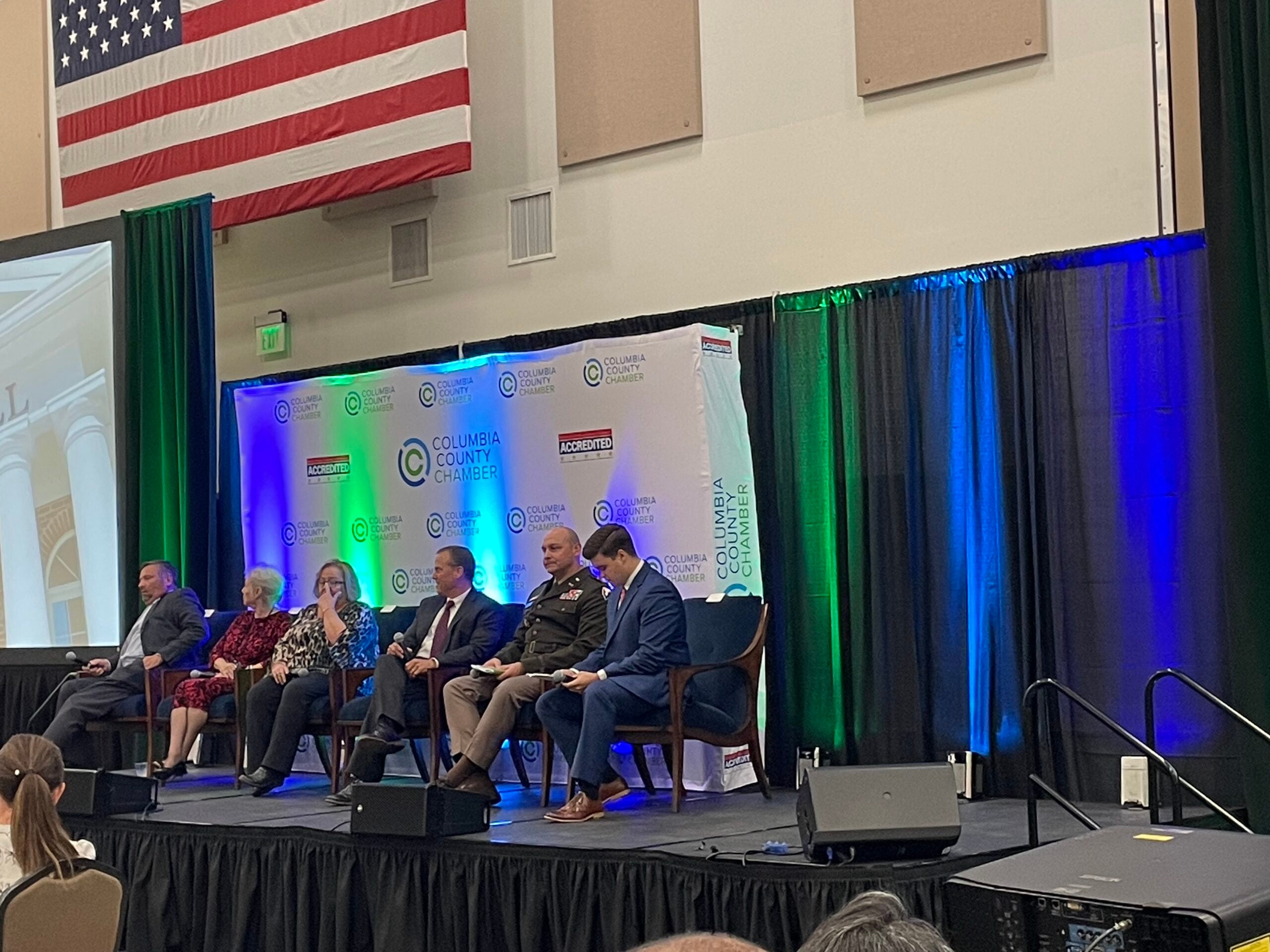The State of the Community event, the Columbia County Chamber of Commerce’s yearly symposium on the county’s progress and projects, kicked off at 6:30 p.m., Thursday night, at the Columbia County Exhibition Center in Grovetown, just after its accompanying business fair.
WRDW anchor Will Rioux presided over the 14th annual iteration of the program, which began with the posting of the colors by the Harlem High School JROTC, and an invocation by Jennifer Miller, vice president of strategy and business development with WellStar MCG Health.
Project updates
Miller also mentioned that construction of the Wellstar MCG Health Center is still on track, noting that some $60 million has been spent on the project out of a budget of more than $260 million.
Cheney Eldridge, executive director of the Development Authority of Columbia County, informed the audience—which included several local business leaders and dignitaries—that the Authority has facilitated “facilitated over $72 million in investment from expanding existing industries,” and that it is currently working on active projects totaling over $7 billion (which she made sure to stress, “with a B”), which could bring in some 1,500 jobs.
MORE: Fort Eisenhower honors lives lost in annual 9/11 Remembrance Ceremony
The bulk of the program consisted of a discussion panel, moderated by Rioux, featuring county leaders: Columbia County School Superintendent Steven Flynt, Grovetown City Administrator Elaine Matthews, Harlem City Manager Debra Moore, Fort Eisenhower’s new garrison commander Col. Anthony Kazor and County Manager Scott Johnson.
Over the course of the discussion, they each underscored various projects and initiatives currently underway. Moore talked about Harlem’s project to convert the former North Harlem Elementary School property into a new city park. Flynt noted the school district’s 10-year building program, which includes the reconstruction of Westmont Elementary School and current upgrading of Lakeside and Evans High Schools.
Matthews spoke on the Grovetown Depot project being underway, expected to start construction within 60 to 90 days, after city council approves it, and mentioned the city’s monthly recognition of local Vietnam and Korea-era veterans.
Kazor highlighted the slogan of Fort Eisenhower’s community outreach campaign, “Eisenhower is your installation,” and noted the efforts of its Morale, Welfare and Recreation (MWR) programs. He also touted activities available for those on post and to the public, such as the Eisenhower Lakes Golf Course, the Tactical Advantage Sportsman’s Complex and the Five-Star Lanes bowling alley.
Johnson mentioned that the county’s Riverwood Park project is currently in its design phase, and spoke on the development as being a “community-minded” means of addressing traffic amid the county’s growth.
“There’s a lot of ways to fight traffic in Columbia County,” he said. “We could widen every road, we could add turn signals and add roundabouts and all those things. But another strategy is to put things closer to people that once they get home, they won’t have to leave, they won’t have to go as far to get the services they need.”
Questions from the community
Answering another question from the audience, Johnson also provided an update on county discussions on the possibility of consolidation and incorporation.
“Many of us, when we travel around the country and people ask where we’re from, a lot of times we’ll say we’re from Augusta, even though we may not be,” Johnson said. “And while we love our partners over at Augusta, Columbia County needs its own identity, and typically, those identities are done by city names instead of county names. People just don’t recognize the county.”
He went on to explain that a feasibility study showed that consolidation would be fiscally viable, considering the hypothetical aim of such an initiative would be avoid an additional layer of government. The county intends, he said, to conduct a series of open houses and public information sessions.
After receiving sufficient public feedback, the Board of Commissioners would push the initiative to the state.
“After hearing from the public it would then go to Atlanta, and if it passed, we would then put it on the ballot for the for the citizens to vote on it,” Johnson said. “So the citizens get the final say and the final word.”
Skyler Q. Andrews is a staff reporter covering business for The Augusta Press. Reach him at skyler@theaugustapress.com.










